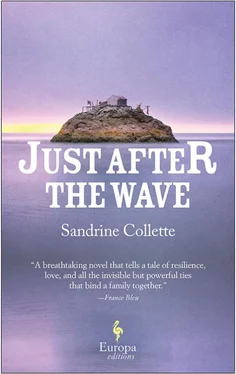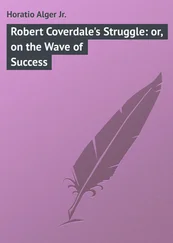Yes, now all is well, from Perrine who has regained a bit of appetite to Louie who has left off his wariness. Until Lucette asks him the question. Louie frowns. But she was bound to ask, because the two grandmothers don’t exactly run into three children adrift on the sea every day, and Lucette is clearly the more curious one, in spite of her illness and fatigue, so there it is, she asks the question they already heard yesterday, an innocuous little question, and yet it is huge, with everything it implies:
“So what are the three of you doing on that boat all alone?”
Perrine’s eyes are bandaged again, but if she had opened them, she would no doubt have done the same thing as Noah: look at Louie. And like Noah she remains silent, waiting for her older brother to reply, and at last he murmurs:
“We’re headed toward the high ground.”
Adele looks puzzled.
“But… just the three of you?”
“Our parents left before us. We have to meet up with them.”
“And they let you go to sea all by yourselves?”
“Um, in fact… they left with the others but there was no more room for us. We were waiting for them on our island but the water was rising. So—”
Noah breaks in.
“Then there was Ades, and he wanted to steal everything we had to eat. And he drowned, and we took his boat. That’s why we have a boat.”
Adele rubs her eyes— I’m not sure I understand. They explain it again, the children, even Perrine from behind her bandage, it gets all muddled up, and it takes all the old ladies’ patience to get the story straight, patience and common sense—and after that they are silent for a long time, their fingers on their lips, eyebrows raised over their wrinkled eyes. Adele clears her throat.
“… so you’re going to the high ground?”
“Yes,” says Louie.
“And you’ve come from Levet.”
“Yes,” says Noah.
“Do you know where we are, here?”
“No,” says Perrine.
“In Tanat.”
Silence. So Adele looks at them and continues.
“That doesn’t mean anything to you.”
And as it’s not a question, they don’t answer.
“Tanat,” explains Lucette, speaking in turn, “is about ten miles from where you lived.”
Louie suddenly turns pale. He understands.
His siblings, no.
Adele looks at him. She smiles at him. She says, it doesn’t matter .
And Louie, in trembling voice, Yes, it does matter .
“What’s wrong?” says Perrine, worriedly.
Three, four, ten seconds. His sister murmurs, Louie? And Louie, almost in tears, suddenly exclaims, pale and unsteady:
“We got lost. We went backwards!”
* * *
They show him on a map. A map from a time still so recent, when there were roads and real villages, not three half-drowned houses where chickens peck looking for insects and parasites, and a despondent boy, his hands ravaged from days of rowing, is talking to two old ladies, next to a blind little girl and a tiny shrimp of a boy. And no matter how Louie peers and points to the roads the old ladies show him, the calculation always comes out the same, between Levet and Tenet there are just over ten miles, and that is how far they’ve gone in eight days, two of them with the motor, hardly more than a mile a day, Oh no , thinks Louie, we went for miles, dozens and dozens of miles, how could .
They did get lost, indeed.
They went round in circles.
A fine arc of a circle; they headed east the way they should, and then because of the sun, and daylight, or the lack of it, and the wind, and fate, and storms, and misfortune, and their parents who had abandoned them, and rain, and hens, and fear—they drifted south, and then random chance brought them back up, in a perfect and terrifying loop, and that’s it, from Levet to Tanat, they rowed fifty or sixty miles to end up with ten, and there they are, in a house that is taking on water, with two woebegone old ladies who are trying to console them.
“The main thing,” says Adele, “is that you’re all alive.”
But Louie shakes his head:
“All of that for nothing…”
“It’s never for nothing.”
And yet. Days of fear and suffering, watching the sea, trembling at the thought of storms, hands bleeding from the oars he had to hold from morning to night, the traps that might come their way, right down to men who hide underwater or the claws of terrified chickens. Days of sleeping badly and getting no rest, wondering if the weight of the anchor won’t pull them down with it when they lower or raise it. Days of waiting for the morning light, of rowing despite the fatigue that was like a dagger in his gut and his back. Days of doubting, silently weeping, not to frighten the others. Days that lasted for centuries: this morning, Louie is one hundred years old.
Do they know, Adele and Lucette, how they have stifled their terror and despair, do they realize, too, that the children no longer have enough food to leave again, or enough hope to believe that this time they will find their way, without a map or a compass? Louie hid his face in his hands so no one would see his distress. In his inner eye, as if indelibly, the map shows him again how they went astray, and his thoughts come tumbling, throbbing: what are they going to do now?
He wants to live, he doesn’t want to let himself die on an island, or in a house once the waters have risen, he doesn’t want to become resigned, even if everything seems to be conspiring against him, even if there are not enough supplies or water, even if they have to choose between having the eggs and eating the hens, even if it takes ten more days to reach the high ground. And that is exactly what comes out of him when he pounds his fist on the terrace, his eyes welling with tears:
“I want to live!”
Just tell him what to do, and he’ll do it.
It might be superhuman. It might be impossible.
He’s game.
But give him a second chance.
Perrine gropes with her hand, closes her fingers around his. Noah comes, too. They sit there in silence. They don’t know what else to do, other than to cling to each other, to show their love.
The old ladies have slipped away, soundlessly. They closed the door to the house behind them.
* * *
For a few days they fashion a strange existence together, the children and the grandmothers, made of bandages and care, waiting, impatience. Perrine’s eye is gradually getting better, Adele gives her half an aspirin when it hurts too much; after three days, Perrine removes her bandage. The sun still dazzles her, never mind, she can see. Sitting at the edge of the terrace, her feet in the water when the heat is stifling, she chirps the songs that Lucette hums when she’s not’s in too much pain—in those moments of pain, the old lady withdraws, they don’t know where, somewhere in the house where no one can see her or hear her, and then she reappears a few hours later, her features still drawn, but wearing that smile that makes their hearts leap, they run up to her but don’t hug her, not to knock her over, they take her hand and sit down next to her. Afterward, Noah looks out to sea.
“When are we leaving?”
Louie feels a lump in his throat every time he hears the question. Leave, yes, but he doesn’t know where. The old ladies have promised to point him in the right direction. Even to give him their compass; they’ll never need it again. But in spite of this he’s afraid. He’s lost his faith. And he already went astray once, so…
“I dunno,” he says.
“Here too, the water is rising. The terrace will be flooded soon.”
“Of course if the water is rising here, it’s rising everywhere.”
“Do you think our house still exists?”
Читать дальше












